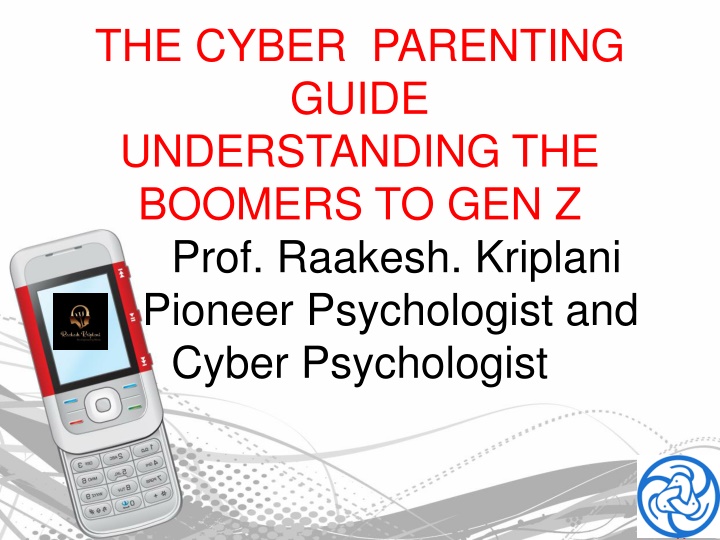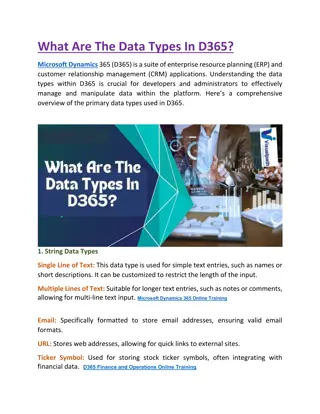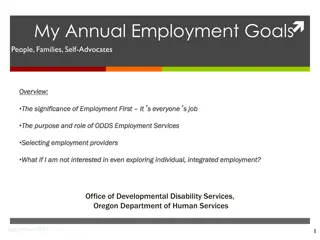Evolution of Family Dynamics: From Integrated Clans to the ME Generation
Explore the journey of family structures from integrated clans in the 1950s to the rise of the ME generation, delving into the changes seen in family sizes, relationships, values shaped by TV, communication methods, and the impact of the digital revolution on modern family dynamics.
Download Presentation

Please find below an Image/Link to download the presentation.
The content on the website is provided AS IS for your information and personal use only. It may not be sold, licensed, or shared on other websites without obtaining consent from the author.If you encounter any issues during the download, it is possible that the publisher has removed the file from their server.
You are allowed to download the files provided on this website for personal or commercial use, subject to the condition that they are used lawfully. All files are the property of their respective owners.
The content on the website is provided AS IS for your information and personal use only. It may not be sold, licensed, or shared on other websites without obtaining consent from the author.
E N D
Presentation Transcript
THE CYBER PARENTING GUIDE UNDERSTANDING THE BOOMERS TO GEN Z Prof. Raakesh. Kriplani Pioneer Psychologist and Cyber Psychologist
What we will cover today. Cause effect relationship How families got shrink What we lost in last 70 years Super concept Different Generation perspective
1980S we shrink into 4 members
1990s- change in values through soaps and TV
Cards company restricted our Expression
And Mobile revolution in 1990 with Pin and chats
WE ALSO HAVE STARTED FACING-LONELINESS
THREE DEMANDS-SINCE 1990/2000 SUPER KID! SUPER KID! SUPERHUMAN! SUPERHUMAN! MULTI ACTIVITY MULTI ACTIVITY EMPLOYEE! EMPLOYEE! RESULTS ? RESULTS ?
AS A RESULT WE LOST WE LOST PROBLEM SOLVING SKILLS PROBLEM SOLVING SKILLS ADJUSTMENT SKILLS ADJUSTMENT SKILLS COPING SKILLS COPING SKILLS RELATIONSHIP SKILLS RELATIONSHIP SKILLS PLEASURE PLEASURE EMOTIONAL STABILITY EMOTIONAL STABILITY SUPPORT SYSTEM SUPPORT SYSTEM
TYPES Generations Baby boomers X Y Z Alpha BETA
Types of generation Turkle s Goldilock s Effect
Generational Overview - Indian Context In India, the Baby Boomer Generation encompasses individuals born roughly between the late 1940s and the early 1960s. In terms of technology, they experienced a gradual shift from traditional modes of communication to early technological advancements like landline telephones, radio, and limited television access.
BABY BOOMERS This generation experienced significant societal changes, including India's independence, rapid urbanization, and the economic liberalization of the 1990s.
Characteristics of the Baby Boomer Generation in India: Strong emphasis on traditional values such as respect for elders, family unity, and cultural heritage. A significant portion of this generation was witness to the post- independence era, and they actively participated in nation- building activities.
Technological Exposure during Upbringing in India: Limited exposure to digital technology during their formative years. Television became more prevalent in urban households, but it wasn't as widespread in rural areas during their youth.
BABY BOOMERS Computers and internet access were not commonplace in households until much later in their lives, often well into adulthood or their professional careers.
Parenting Approaches in India's Baby Boomer Generation: Emphasis on discipline, education, and career stability in parenting. Parental guidance was based on traditional values and teachings rather than digital influence. Limited exposure to technology influenced their cautious approach to embracing technological advancements in parenting styles.
Challenges Arising from the Digital Age for Baby Boomer Parents in India: Rapid Technological Evolution: The swift evolution of technology can be overwhelming for Baby Boomer parents. They might struggle to keep up with the latest gadgets, social media platforms, and digital trends that their children are exposed to.
Generation Gap and Communication: Communication gaps between Baby Boomer parents and their tech-savvy children are common. Differences in understanding technology and its impact on daily life create challenges in fostering open dialogues and understanding each other's perspectives.
BABY BOOMERS Digital Safety Concerns: Baby Boomer parents may face difficulties in monitoring their children's online activities, given their limited understanding of digital platforms. Concerns regarding online safety, exposure to inappropriate content, and cyberbullying are prevalent.
Adaptation Struggles: The need to adapt parenting styles to accommodate digital influences can be daunting. Baby Boomer parents may find it challenging to strike a balance between embracing technology for educational purposes and limiting excessive screen time.
Educational Support : Limited knowledge about digital tools and online educational resources might hinder Baby Boomer parents' ability to actively support their children's learning experiences in a digital environment.
SOCIAL 1.Social Impact: The digital age has altered social dynamics. Baby Boomer parents might face challenges in comprehending the impact of social media on their children's social interactions, mental health, and overall well-being.
Adaptation Struggles and Concerns: Resistance to technological advancements due to unfamiliarity or discomfort with digital tools. Concerns about the potential negative effects of excessive screen time on their children's development. Frustration or feelings of inadequacy when attempting to navigate and understand complex digital platforms and devices.
TYPES OF GENERATIONS.
Gen X 1961 1981 Take job seriously Entrepreneurial Apathetic/cynical Low level of trust toward authority Alienated as kids Era of the Latchkey Child Parent/child Involvement: Distant
Characteristics of Generation X in India: Born roughly between the early 1960s to the early 1980s in India. Experienced economic and political changes like globalization and technological advancements during their formative years. Often referred to as the 'Latchkey Generation' due to their experience of both parents working, leading to more independence and self-reliance.
Technological Exposure during Upbringing: Witnessed the advent of personal computers, video games, and early forms of the internet during their youth. Limited but increasing exposure to technology compared to the Baby Boomer Generation. Gradually adapting to digital advancements during their adolescence and early adulthood.
Generation X's Approach to Parenting in India Psychological Inputs from Generation X on Cyber Parenting: Embracing technology as it became more integrated into daily life and work. Adopting a more pragmatic and adaptable approach to parenting, blending traditional values with technological advancements. Encouraging independence and critical thinking in their children while navigating digital spaces.
Technology Adaptation in Parenting Styles: Leveraging technology for educational purposes and communication within the family. Setting boundaries and guidelines for screen time and online activities. Striving to stay updated with technological trends to better understand and guide their children.
Challenges Faced by Generation X Parents in India Specific Challenges in Cyber Parenting: Balancing traditional parenting values with the rapid evolution of technology. Managing the pervasive influence of social media and digital distractions on their children's lives. Addressing concerns regarding online safety, privacy, and cyberbullying.
Challenges Faced by Generation X Parents in India Specific Challenges in Cyber Parenting: Balancing traditional parenting values with the rapid evolution of technology. Managing the pervasive influence of social media and digital distractions on their children's lives. Addressing concerns regarding online safety, privacy, and cyberbullying.
Balancing Technology with Parenting Approaches Struggles in Balancing Technology and Parenting: The dilemma of allowing enough exposure to technology for educational purposes without overindulgence. Navigating conflicts arising from differing viewpoints on screen time and digital engagement within the family. Striving to maintain a healthy balance between offline activities, family time, and screen-based interactions.























